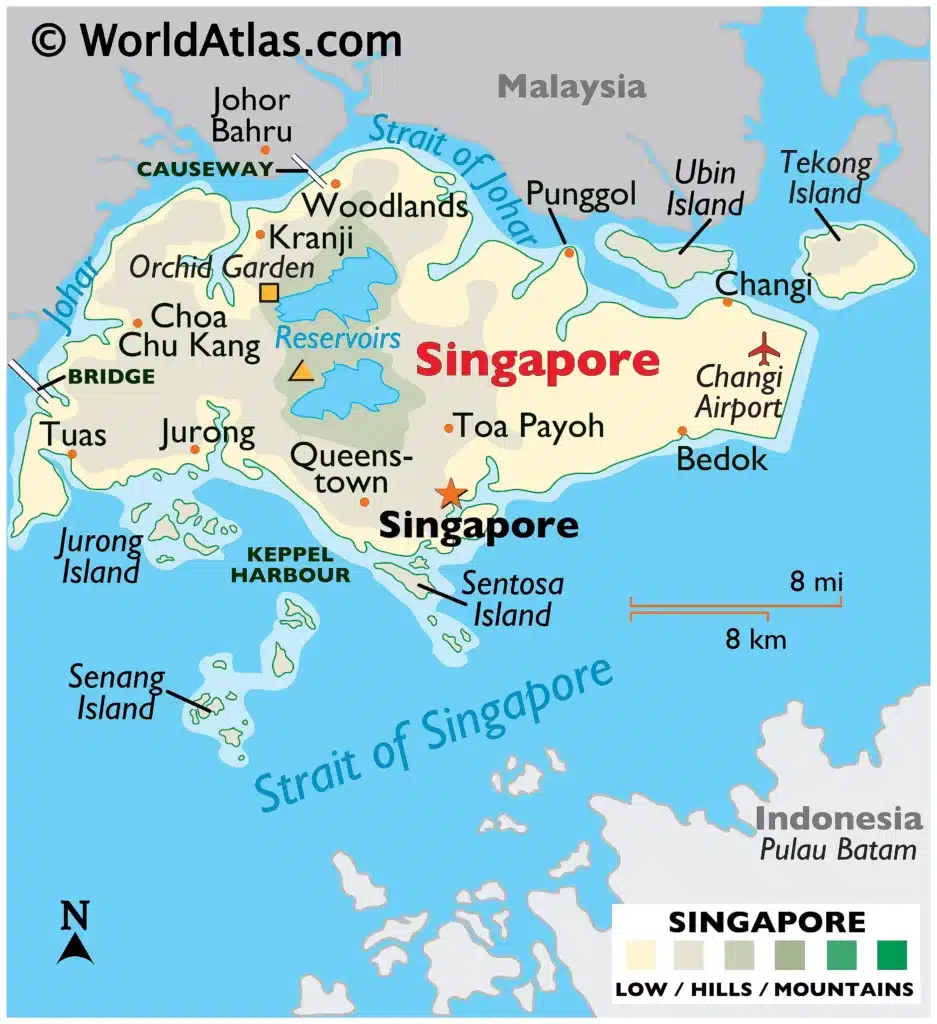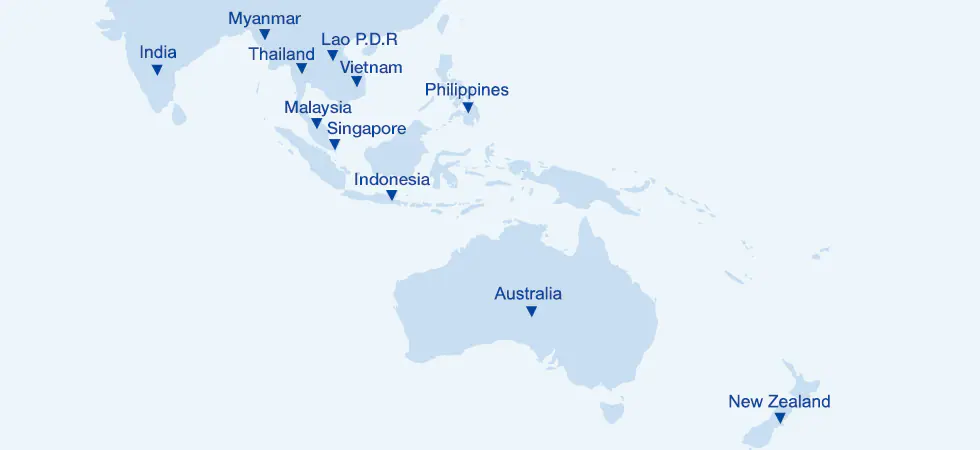Singapore has been ranked 2nd in the most powerful passport report ‘Henley Passport Index 2021’. Singapore is the only country in Asia with an AAA sovereign credit rating from all major rating agencies.
India’s connection with Singapore dates back to the Cholas who are credited with naming the island and establishing a permanent settlement. The more modern relationship is attributed to Sir Stamford Raffles who, in 1819, established a trading station on the Straits of Malacca to protect, particularly from the Dutch, the East India Company ships carrying cargo between India and the region, especially China.
India was among the first countries to set up diplomatic relations after the independence of Singapore on 24 August 1965. The close relationship shared by India and Singapore is based on convergence of economic and political interests. The process of economic reforms in India since the early 1990s created a strong basis for cooperation with Singapore, opening up possibilities for significant presence in each other’s economies. Singapore has played an important role in reconnecting us to the countries of South East Asia since the inception of our Look East Policy in the early 1990s.

Key Agreements between both the Nations
- Comprehensive Economic Cooperation Agreement (CECA), 2005.
- Double Taxation Avoidance Agreement (1994, Protocols signed in 2011),
- Bilateral Air Services Agreement (1968, revised in April 2013),
- Defence Cooperation Agreement (2003),
- MoU on Foreign Office Consultations (1994)
- Mutual Legal Assistance Treaty (2005) and
- MoU on Cooperation in the field of Vocational Education and Skills Development.
- 2007 witnessed the creation of a Joint Ministerial Committee (JMC) headed by the Foreign Ministers, the launch of a bilateral CEO’s Forum and the announcement of a Strategic Dialogue.

Following the conclusion of Comprehensive Economic Cooperation Agreement (CECA) of 2005, this robust relationship was elevated to a Strategic Partnership in 2015.
Areas of Cooperation
Framework of the Bilateral Relationship
- India-Singapore relations are based on shared values and approaches, economic opportunities and convergence of interests on key issues. Political engagement is regular. Defence relations are particularly strong.
- Economic and technological ties are extensive and growing.
- Cultural and human links are very vibrant. There are more than 20 regular bilateral mechanisms, dialogues and exercises.
- There is great convergence on a broad range of international issues and both are members of a number of forums, including East Asia Summit, G20, Commonwealth, IORA (Indian Ocean Rim Association) and IONS (Indian Ocean Naval Symposium)
Defence and Security Cooperation
- India and Singapore have a longstanding and comprehensive partnership, which includes,
- Annual Ministerial and Secretary level dialogues; Staff level talks between three wings of Armed forces;
- training of Singapore Army and Air force in India (10th edition in 2019) every year;
- annual exercises including India’s longest uninterrupted naval exercise with any other country (26th edition in 2019); ship visits from Navy and Coast Guard
- Singapore’s participates in IONS and multilateral Exercise MILAN hosted by Indian Navy.
- Singapore’s membership of IORA and India’s membership of ADDM+ (ASEAN Defence Ministers’ Meeting – Plus) provides platform for both countries to coordinate positions on regional issues of mutual concern.
- New developments include the inaugural Trilateral Maritime Exercise between India, Singapore and Thailand (SITMEX), announced by PM Modi in his Keynote address at the 2018 Shangri La Dialogue in September 2019 in Andaman Sea with the intention to conduct it annual at alternative locations
- India and Singapore share similar concerns about the challenges posed by terrorism and extremism and have found it mutually beneficial to evolve a broad framework of security cooperation.
Science & Technology Cooperation
- ISRO launched Singapore’s indigenously built micro-satellites since 2011.
- MOUs have been signed in areas of artificial intelligence, machine learning, cognitive computing and big data analytics to improve healthcare, cybersecurity, automation, mobility, smart energy systems and e-governance
Trade, Economic and Development Cooperation
- Major areas of cooperation have been (i) Scale up Trade & Investment; (ii) Speed up Connectivity; (iii) Smart Cities & Urban Rejuvenation; (iv) Skill development; and (v) State focus.
- Singapore is India’s largest trade partner in ASEAN. It is the leading source of Foreign Direct Investment, among the largest sources of External Commercial Borrowings and Foreign Portfolio Investment
- Bilateral trade expanded after the conclusion of CECA from USD 6.7 billion in FY 2004-05 to USD 27.85 billion in 2018-19.
- . In the fiscal 2019-20, total inflow until September 2019 was USD 8.01 billion while Cumulative FDI from Singapore into India (April 2000- September 2019) is USD 91.02 billion, accounting for 20% of total inflows into India
- About 9000 Indian companies are registered in Singapore. 6 PSUs, 9 banks, India Tourism, CII, FICCI, Air India, Jet Airways have their offices in Singapore. More than 440 companies from Singapore are registered in India.
- Singapore is now directly connected to 15 Indian cities by 8 airlines with more than 500 weekly flights both ways.
- India the third largest source in tourism for Singapore.
- Singaporean companies continue to participate in a number of smart city, urban planning, logistics and infrastructure projects. Singapore is working with Rajasthan, Himachal Pradesh and Maharashtra in preparing Master Plans for townships.
- Singapore is working with the Central and state Governments as well as Government organisations to establish skill development centres in various sectors
- FinTech & Innovation: Cooperation in the areas of technology, innovation, fintech and startups have grown. In 2019. A Pilot demo of BHIM UPI QR based payments was launched in Singapore on 13 November during the 2019 Fintech Festival
Cultural Cooperation
- Cultural exchanges include performing arts, theatre, museum exchanges, art, languages, and youth exchanges
- Regional and community based organizations are also active in promoting language teaching, yoga and arts.
Indian Community
- Ethnic Indians constitute about 9.1 % or around 3.5 lakhs of the resident population of 3.9 million in Singapore.
- In addition, among the 1.6 million foreigners residing in Singapore, about 21 % or around 3.5 lakhs are Indian expatriates holding Indian passports, mostly serving in financial services, IT, students, construction and marine sectors.
- Singapore has the highest concentration of IIT and IIM alumni in any one city outside India.
- There are about 1 lakh Indian migrant workers in Singapore. Singapore, however does not feature in the ECR category.
- Tamil is one of the four official languages of Singapore.
- Hindi, Gujarati, Urdu, Bengali and Punjabi are also taught in schools. Welfare and well-being of the Indian nationals, including Indian workers feature prominently in consular responsibilities of the Mission.
Significance of Singapore for India
- India-Singapore has a wide-ranging relationship that is as strategic as well as economic.
- Singapore is an important investment source as well as a destination for Indians. Singapore was the first country with which India signed a Comprehensive Economic Cooperation Agreement, which is currently being upgraded. Singapore has established strong ties with Indian states such as West Bengal, Rajasthan, Andhra Pradesh, and Telangana. As a result, economic cooperation is growing.
- Both countries are seeking to explore other areas such as tourism and skill development.
- Singapore is also an essential partner in many areas of India’s development priorities, including smart cities, urban solutions, the financial sector, skills development, ports, logistics, aviation, and industrial parks.
Singapore’s role in enhancing India’s tie with ASEAN
- Singapore, being one of ASEAN’s founding members, plays a critical role in sustaining regional peace and security, as well as supporting ASEAN’s goal of creating and fostering development and prosperity.
- When Singapore joined ASEAN, it was an obligation since it needed to establish its credibility as an independent nation and produce additional trade, but Singapore later evolved to a particular level in comparison to the rest of the ASEAN countries. Slowly, it grew to the point that Singapore began giving trading posts and capital entrepreneurship. 88 Singapore backed the establishment of the ASEAN Free Trade Zone.
- Singapore has been influential in speaking her opinion in ASEAN, which has resulted in India getting the dialogue partnership in ASEAN in 1995 before India was only a sectoral conversation partner. Singapore was also instrumental in bringing India and the ASEAN countries together.
- It is worth repeating that the signing of the CECA with Singapore was a significant step forward for both countries. Singapore supports India’s ambition to become a major and prominent participant in the Southeast Asian region, and in order for India-ASEAN relations to be fruitful, Singapore is more than happy to act as a go-between.
- In the international arena, India has a close working relationship with Singapore, and a number of regional mechanisms connect these two countries together, including ASEAN, the ASEAN Regional Forum (ARF), ASEAN plus three, the East Asia Summit, and the ASEAN Defence Ministers Meeting (ADMM) Plus. Singapore has vigorously backed India’s expanded geostrategic influence in ASEAN, as well as India’s permanent membership in the United Nations Security Council.
